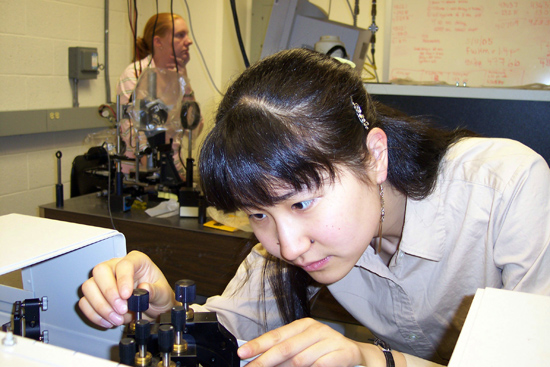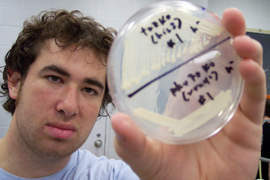Hughes Fellows Test-Drive the Life of a Research Scientist
 |
 Summer Hughes Fellows Maiko Kondo ’07 (top) and Brandon Stein ’07 (left) work on their research projects in Wesleyan labs. Hughes Fellows have 10 weeks to finish a research project of their choice. Faculty members provide guidance and instruction. Summer Hughes Fellows Maiko Kondo ’07 (top) and Brandon Stein ’07 (left) work on their research projects in Wesleyan labs. Hughes Fellows have 10 weeks to finish a research project of their choice. Faculty members provide guidance and instruction. |
| Posted 06/15/05 |
|
In Wesleyans Mukerji Lab, Maiko Kondo 07 studies peptides modeled after those found in Alzheimers plaques. Nearby in the Flory Lab, Brandon Stein 07 examines nuclear functions of telomere-associated proteins. As Wesleyan University Summer Hughes Fellows, Kondo and Stein have 10 weeks to complete their research, work one-on-one with a faculty advisor and participate in a variety of Hughes activities. Theyre among 49 students who received grants from the Hughes Program in the Life Sciences, funded by the Howard Hughes Medical Institute. Michael Weir, professor of biology and chair of the Biology Department is the director of the Hughes Program in the Life Sciences. Laurel Appel, visiting associate professor of biology and senior research associate is the program coordinator. Weir says the Hughes Fellows can test-drive being a research scientist in one of the Wesleyan research groups. This experience, however, comes with the successes and disappointments of exploring a new field of science. “When you come in to the lab in the morning, you don’t really know what you are going to find out by the end of the day or week — that’s the excitement, and sometimes frustration, of doing full-time research, Weir says. The annual summer program is in its 17th year at Wesleyan and immerses undergraduates in a research topic that fascinates them without the time constraints and workload inherent to a full load of classes normally taken during the academic semesters. Thirty-three faculty members are on hand to help guide the students research. This year, students are studying topics as diverse as Serotonin and its Effect on Dentate Gyrus Neurogenesis, Patterns in hiring practices for tenure-track positions in the geosciences, and Investigating the Beginnings of Chimpanzee Research in the United States, among several others. Research training during the Hughes Summer Program allows undergraduates a valuable opportunity to make serious strides of progress on a project, to have a positive experience doing full-time research, and to possibly solidify a desire to pursue a career in the experimental sciences, says Steins summer advisor and Assistant Professor of Molecular Biology and Biochemistry Mark Flory. Kondo decided to pursue a degree in molecular biology and biochemistry after suffering from allergies her entire life. Ultimately, she wants to know why this is, and how people can be cured. As I studied further in this field, I started to hope that I would be able to conduct research, exploring the relations between allergy and the immune system in my future, she says. The summer research program gives me a good opportunity to learn about research techniques, which are needed to approach my goal. In addition to research, the Hughes Summer Program includes a special day-long workshop for all interested students, faculty, and staff on an emerging topic in the Life Sciences. This year, the Liz Lerman Dance Exchange presents, “Breaking Boundaries: Scientists and Dancers, Investigations and Choreograph.” The summer program also includes a seminar series given by outside speakers who design their talks for the undergraduate audience of varying scientific backgrounds and fields. This years speakers include Margaret Livingstone of Harvard Medical School; Anna Martini of Amherst College; Mikhail Levin of the University of Connecticut Health Center; Katrina Catron of Boehringer-Ingelheim Pharmaceuticals; Remus Th. Dame of Vrije Universiteit; and Monica Carson of the University of California. Although the research is intense, the program allows ample socialization time. Two picnics, a student-run movie series, softball league, field trips, access to the Freeman Athletic Center and drop-in lunches are offered for participants. Students applying for the 2006 Hughes Program must do so by March 3, 2006. The grant budget allows for 18 stipends, but with generous contributions from participating departments and faculty, as well as Financial Aid funds, the program can accept between 40 and 50 students each year. Students are responsible for their own housing. The program concludes August 5 with a poster session. For more information contact Maureen Snow, administrative assistant for the Hughes Program in the Life Sciences, at msnow@wesleyan.edu. |
| By Olivia Drake, The Wesleyan Connection editor |

